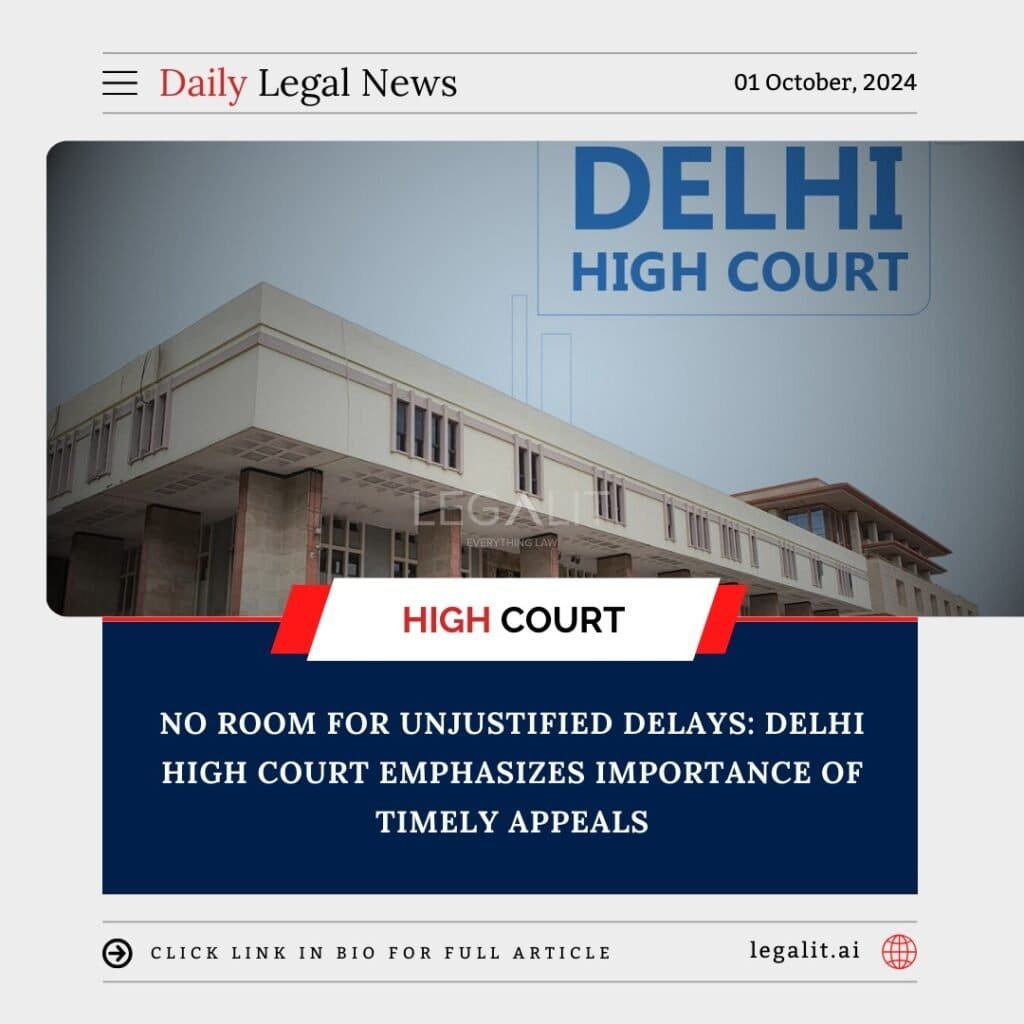
In a recent ruling, the Delhi High Court has underscored the importance of adhering strictly to statutory deadlines, emphasizing that delays in filing appeals or other legal actions cannot be condoned if a satisfactory explanation is not provided. This judgment serves as a reminder of the importance of punctuality in judicial proceedings and signals the judiciary’s commitment to enforcing timelines to ensure the efficiency and integrity of the legal process.
The Significance of Timely Legal Actions
Legal systems around the world operate on the principle that time limits are essential for the smooth administration of justice. Timeliness not only ensures the efficient progression of cases but also helps maintain fairness for all parties involved. When a party fails to adhere to stipulated timelines, it can create unnecessary burdens for courts and unfair disadvantages for opposing parties.
In its recent ruling, the Delhi High Court reiterated this foundational principle. The court made it clear that an explanation for a delay must be satisfactory and compelling for it to consider an extension of the filing period. Without a legitimate reason, the court will not entertain delays—no matter how minor they may seem.
The Case in Focus
The court’s observation arose from a matter where the petitioner sought condonation of a delay in filing an appeal. The delay, though spanning only a few days, was scrutinized heavily by the judges. The petitioner argued that circumstances beyond their control had contributed to the delayed filing. However, the court found the provided explanation insufficient and dismissed the plea for condonation.
In its ruling, the court highlighted that leniency in allowing delays without proper justification could set a dangerous precedent, compromising the procedural discipline required for the legal system to function effectively. The court emphasized that a lack of discipline regarding deadlines can lead to a breakdown in the system, ultimately delaying justice for all involved parties.
Why Even Short Delays Matter
The Delhi High Court’s stance is rooted in the broader principle that “justice delayed is justice denied.” Even seemingly short delays, if allowed without proper justification, could lead to larger issues within the judiciary, such as a backlog of cases and inefficiencies in the system. Courts in India, like those in many other countries, face heavy caseloads, and adherence to prescribed deadlines is vital to avoid adding further strain to an already burdened judicial system.
Furthermore, the High Court emphasized that allowing unwarranted delays can lead to an erosion of public trust in the judicial system. If one party is allowed to file late without sufficient reason, it may appear to others that the rules are flexible, leading to potential abuses of the process. This could diminish the perception of the judiciary as impartial and fair.
The Need for Accountability
The decision underscores the judiciary’s intent to hold parties accountable for their actions. It is a reminder that deadlines in legal matters are not arbitrary; they serve a critical function in maintaining order and predictability. When a litigant fails to meet a deadline, it disrupts the entire system. The Delhi High Court made it clear that parties must act diligently, and they cannot take procedural deadlines lightly.
In this case, the court was particularly firm, indicating that even a delay of a few days cannot be condoned if the explanation is inadequate. It underscores that it is not the duration of the delay alone that matters, but the reason behind it. The explanation must be plausible, and evidence must support the assertion that the delay was unavoidable despite the party’s best efforts to meet the deadline.
Impact on Future Cases
This ruling could have a significant impact on future cases, especially those involving appeals and applications for condonation of delay. Legal practitioners and litigants are now reminded to take deadlines seriously and ensure they have valid reasons, backed by evidence, if they seek an extension. The Delhi High Court’s message is clear: there must be a balance between flexibility in accommodating genuine difficulties and the need to prevent misuse of the judicial process.
The judgment also encourages greater responsibility on the part of legal counsel. Lawyers must advise their clients about the critical nature of deadlines and ensure that all necessary actions are taken well within the stipulated timeframes. This helps protect their clients’ interests while also contributing to the efficient functioning of the judicial system.
Conclusion
The Delhi High Court’s ruling on the condonation of delays serves as a stern reminder of the importance of adhering to procedural timelines in the legal system. Delays—whether minor or significant—must be justified with a satisfactory explanation. By enforcing these rules, the court aims to uphold the efficiency, reliability, and fairness of the judicial process.
The decision underscores the principle that the law is not merely about rights but also about responsibilities. Litigants and their counsel must recognize that deadlines are integral to the delivery of justice. Any lapse in meeting those deadlines must be accounted for adequately, failing which the law will not extend its favor. This approach ultimately helps in reducing case backlogs, ensuring that justice is delivered promptly, and fostering public confidence in the judicial system.